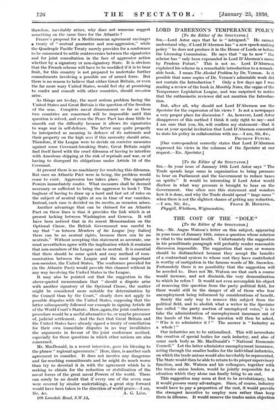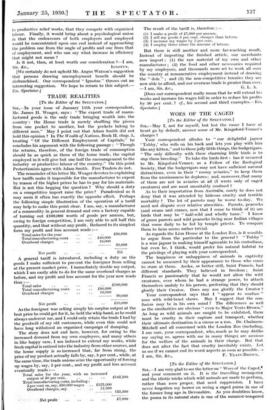THE COST OF THE "DOLE"
[To the Editor of the SPECTATOR.] SIR,—Mr. Angus Watson's letter on this subject, appearing in your issue of January 18th, raises a question whose solution is vital to the national health. Unfortunately the suggestion in his penultimate paragraph will probably render reasonable discussion impossible. The suggestion that men or women should be disfranchised because they accept the benefits of a contractual system to whose cost they have contributed is worthy of castigation in the famous words of Mr. Snowden. Fortunately there is no possibility that the suggestion will be acceded to. Does not Mr. Watson see that such a course would increase, and not diminish, the very demoralization to which he refers ? It would not even accomplish his object of removing this question from the party political field, for there would still be the danger of all of those who fear unemployment being influenced by considerations of benefit.
Surely the only way to remove this subject from the political field, and to abolish what a writer in the Spectator has called " the party auction of unemployed votes,' is to take the administration of unemployment insurance out of the hands of the State. The question will then be asked, " Who is to administer it ? " The answer is " Industry as a whole I "
Our industries are to be rationalized. This will necessitate the creation of special bodies for each industry; and also of some such body as Mr. MacDonald's " National Economic 'Council." Let the latter administer unemployment insurance, acting through the smaller bodies for the individual industries, on which the trade unions would also inevitably be represented. The State would then be able to return to its propei supervisory function, and Mi. Watson and his colleagues, together with the trades union leaders, would be jointly responsible for a situation which they alone can finally bring to an end. •
This suggestion may seem at first to be revolutionary, but it would possess many advantages. Since, of course, industry would have to pay a proportion of the cost, it would provide the strongest incentive to employ men rather than keep them in idleness. It would remove the trades union objection to productive relief works, that they compete with organized labour. Finally, it would bring about a psychological union in that the endeavours of both employers and employed would be concentrated upon one end instead of approaching the problem one from the angle of profits and one from that of employment, and who can say what increase in efficiency that might not mean ?
Is it not, then, at least worth our consideration ?—I am,
[We certainly do not uphold Mr. Angus Watson's suggestion that persons drawing unemployment benefit should be disfranchised. Our correspondent " Ignotus " throws out an interesting suggestion. We hope to return to this subject.— En. Spectator.] • •







































 Previous page
Previous page